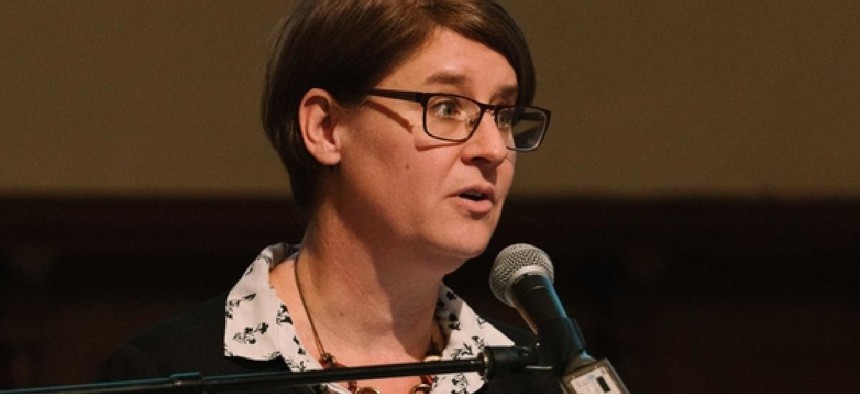The Jewish Board takes top honors at 10th annual NYCT Nonprofit Excellence Awards

The Jewish Board claimed the Gold Prize, Neighbors Link of Northern Westchester received the Silver and Per Scholas took home the Bronze at the 10th annual New York Community Trust Nonprofit Excellence Awards held Friday, Dec. 2 at the New York Academy of Medicine.
The awards are designed to highlight best practices for management excellence among nonprofits in New York City, Long Island and Westchester County. The Nonprofit Coordinating Committee of New York, or NPCC, created the Nonprofit Excellence Awards in 2006 and manages the program in collaboration with The New York Community Trust and Philanthropy New York. The application process includes two written applications and an in-person presentation. Winning organizations receive a total of $60,000 in cash awards and scholarships for Columbia Business School Executive Education Programs in Social Enterprise.
Each organization was recognized for demonstrating excellence in eight key areas, covering everything from diversity and inclusivity to information technology systems. However, the decision by the Jewish Board to take on about 8,000 additional clients and millions of dollars in behavioral health programs after Federation Employment and Guidance Services filed for bankruptcy in 2015, certainly also worked in their favor. The Jewish Board was also a distinguished honoree at New York Nonprofit Media’s Cause Awards breakfast in November.
“I wouldn’t necessarily say it was that they took over $75 million in programming – but how,” said Melkis Alvarez-Baez, NPCC’s deputy director. “How they’ve been able to manage the decision and then, since then, the work that they’ve done to make sure that they’re no longer two organizations but one, I think has really made them shine.”
David Rivel, The Jewish Board’s CEO, said he appreciated the award and the responsibility it places on his organization.
“We’re really devoted to the success of the entire field. We’ve really tried to take a leadership role in getting government to pay their fare share of services that they’re asking us to deliver on their behalf,” Rivel said.
During the best practices workshop held just before the awards presentation, Rivel noted his organization begins each year with a $19 million deficit. And that’s before any additional services or innovations are factored in. “It’s a daunting place to be,” Rivel said. He intends to use any additional leverage the award provides to help draw attention to this challenge.
“I hope that people will see that, ‘Well, they’re a well-managed organization and if they’re having trouble, I guess, maybe it’s not them, it’s us.’ I’m hoping that’s the reaction,” he said.

David Rivel of The Jewish Board with staff and trustees.
“I think right now we’re just going to celebrate our management, our staff and our board members that make this all possible,” said Carola Bracco, executive director of Silver Prize winner, Neighbors Link, which helps immigrants integrate into their communities. “Because we’ve got a hard year ahead,” Board Chairwoman Cynthia Brill added, alluding to significant concerns under the upcoming administration of President-elect Donald Trump, about the safety of identification information undocumented immigrants have submitted to New York government agencies.
Plinio Ayala, executive director of Per Scholas, which prepares low-income people for careers in technology, said the application process for the award helped him focus on strengthening the organization’s communication efforts. Ayala has worked to implement a simple shift in messaging – emphasizing the strengths of his participants instead of the formidable challenges and needs they’re facing – that has yielded monetary results, helped to build partnerships and drawn additional talent to the organization.
“As a kid growing up in the South Bronx, I can tell you I didn’t want to be labeled as poor and disadvantaged and all of that. That was really the wrong message for us,” Ayala said.
“We’re trying to help create a solution with folks that could be amazing members of that solution,” he added.
The awards were slightly retooled this year, with everything from the application process to the actual ceremony getting a fresh look by Sharon Stapel, who has served as NPCC’s executive director for just over a year. One change was obvious from the JPMorgan Chase-branded items among the swag each attendee received: For the first time, corporate sponsors were invited to support the program.
“Sometimes, the value of having new eyes is that you can see opportunities that may have been less obvious in the past,” Stapel said. “This excellence awards event is the operationalizing of the principles that they believe make a good and strong nonprofit. So there’s a really good fit here for a lot of our corporate sponsors.”
The application process was also adjusted in an effort to cast a wider net. NPCC launched a shortened and simplified application process and included specific standards and aspirations for each of the Eight Key Areas of Nonprofit Excellence. For example one area is titled: “Communications are strategic, effective and build brand.” In the list identifying what a “standard” practice is, “The organization regularly updates website content with information about current developments.” For the aspirational description, “Organizational practices ensure safety of users of social media from online harassment.”
“A lot of the changes came about through feedback from our applicants, from our selection committee members, from funders and others that care about the awards program. We thought that the 10th year was a great opportunity to really make some of those changes,” Alvarez-Baez said. “We say that the awards program is a learning opportunity and we wanted to make sure that we could back that up for every organization that engaged with the process at every level.”
